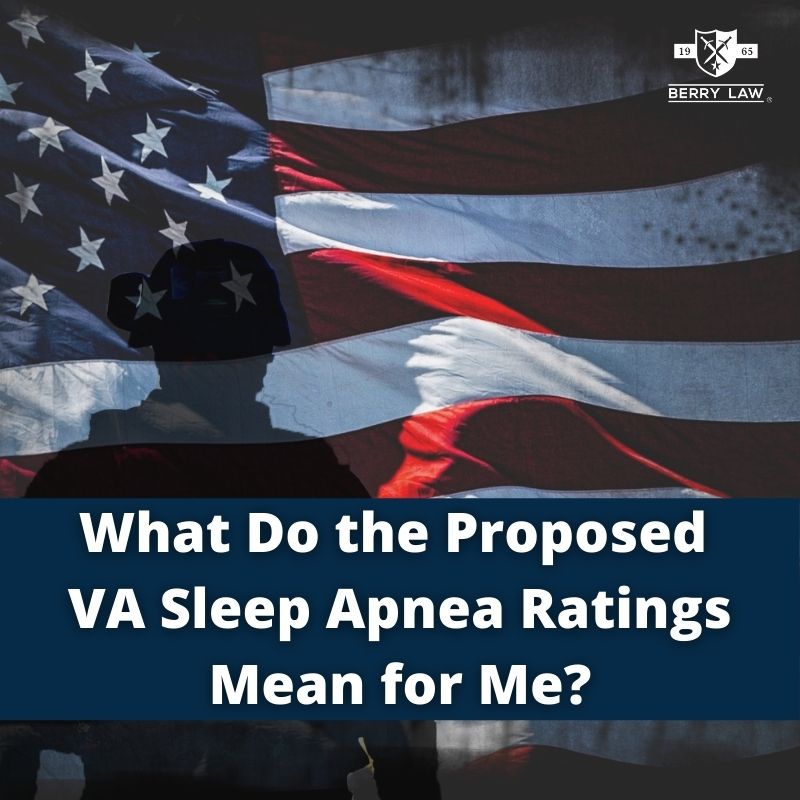
VA announced on February 14 that it intends to change the way it rates sleep apnea for veterans. Sleep apnea is one of the most common disabilities claimed by veterans, so you may be wondering what this change means for you.
How VA Rates Disabilities
Once VA decides that a veteran’s disability is related to their military service, the VA assigns a disability percentage, or “rating,” to that disability based on how severe it is. VA determines the appropriate rating based on a rating schedule that applies to each individual disability.
All of a veteran’s service-connected disabilities are then combined to determine their overall percentage rating. This combination of disability ratings is not as simple as adding together two numbers. VA has a complicated formula represented in a table to determine what a combined rating is. Use our combined rating calculator to figure out your combined rating.
How Does VA Rate Sleep Apnea Now?
Right now, service-connected sleep apnea is assigned a 50 percent rating if you are prescribed a CPAP machine. If you have a CPAP and you also have chronic respiratory failure or similar conditions, you can get a 100 percent rating. If you don’t need a CPAP but experience chronic, excessive daytime sleepiness you get 30 percent.
The most common rating for service-connected sleep apnea is 50 percent based on needing a CPAP.
How Are Sleep Apnea Ratings Changing?
If the rule changes go into effect (which isn’t certain yet), then the way sleep apnea is rated would change significantly.
As the proposed rule is written, you would not get any compensation for asymptomatic sleep apnea. Ten percent would be awarded if treatment for sleep apnea gives only incomplete relief. A 50 percent rating would be assigned if treatment was ineffective or you can’t use treatments because of another condition. And a 100 percent rating would apply where treatment is ineffective (or impossible because of other conditions) and you have organ damage as a result.
Based on this proposed change, it’s very possible that Veterans who would have gotten 50 percent under the current ratings will instead get 0 or 10 percent under the new rating system.
On the surface, this seems to make sense, because VA ratings are supposed to represent a Veteran’s loss of earning potential due to service-connected disability. And if you are getting treated for a condition and the treatment is totally effective, then your earnings aren’t harmed by that disability.
Proposed Requirement to Rate Based on Sleep Studies
However, there’s a little catch to the proposed ratings changes. Whether treatment grants “incomplete relief” or is “ineffective,” would depend on the results of a sleep study.
What’s wrong with this? A couple things.
First, it requires Veterans who apply for an increased rating to undergo unnecessary sleep studies. Anybody who’s been through a sleep study—whether in a lab or at home—knows that it’s uncomfortable and disruptive to your life.
Second, a report based on a sleep study contains only the information that was measured while you were asleep. That includes things like how many apneas you had per hour, how much you moved around, your breathing rate, and your blood oxygen levels.
But a sleep study doesn’t actually explain how your sleep apnea affects you during the day when you might be trying to work.
How Sleep Apnea Affects Your Daytime Life
Sleep apnea doesn’t just affect Veterans in the ways a sleep study would capture. Once a Veteran with sleep apnea wakes up, they may experience dry mouth, headaches, excessive daytime sleepiness or falling asleep while trying to work or accomplish other tasks, difficulty paying attention or following complex instructions, and irritability.
By basing the proposed new ratings on a sleep study alone, VA is leaving out all of these daytime symptoms that really do affect Veterans’ ability to work a full-time job and earn an income.
What Should Veterans with Sleep Apnea Do About the New Ratings?
If you have sleep apnea that you think began in or is related to your military service, file your claim for service connection NOW if you haven’t already.
For disabilities that were service-connected before a change in ratings policy, VA is not allowed to reduce a rating based on the policy change. If you file a claim for service connection, and the claim is later granted, it should be effective the date of your original claim in most cases. Then for the time period beginning when the rating policy changes, VA has to rate your disability under either the old or new version of the ratings—whichever gives you the most money.
You Can Affect VA Ratings Policies
If you have opinions about the proposed changes to VA’s rating system, you have the opportunity to make your voice heard. Public comments are due by April 18 and can be submitted online (https://www.regulations.gov/document/VA-2022-VBA-0009-0001). VA will be required to consider all the comments it receives and explain why it does or doesn’t change its draft proposed rules as a result.
Our monthly newsletter features about important and up-to-date veterans' law news, keeping you informed about the changes that matter.